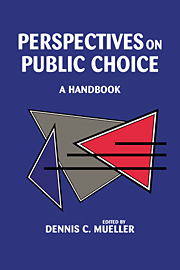Book contents
- Frontmatter
- Contents
- Preface
- Contributors
- 1 Public choice in perspective
- Part I The need for and forms of cooperation
- Part II Voting rules and preference aggregation
- Part III Electoral politics
- Part IV Individual behavior and collective action
- Part V Public choice in action
- 20 Modern bureaucratic theory
- 21 The positive theory of public bureaucracy
- 22 The political economy of taxation
- 23 Rent seeking
- 24 Endogenous protection: The empirical evidence
- 25 Why does government's share of national income grow? An assessment of the recent literature on the U.S. experience
- References
- Name index
- Subject index
24 - Endogenous protection: The empirical evidence
Published online by Cambridge University Press: 04 May 2010
- Frontmatter
- Contents
- Preface
- Contributors
- 1 Public choice in perspective
- Part I The need for and forms of cooperation
- Part II Voting rules and preference aggregation
- Part III Electoral politics
- Part IV Individual behavior and collective action
- Part V Public choice in action
- 20 Modern bureaucratic theory
- 21 The positive theory of public bureaucracy
- 22 The political economy of taxation
- 23 Rent seeking
- 24 Endogenous protection: The empirical evidence
- 25 Why does government's share of national income grow? An assessment of the recent literature on the U.S. experience
- References
- Name index
- Subject index
Summary
Endogenous: Developing from within; originating internally. In physiology, the process in a plant or animal by which food is changed into living tissue.
Endogenous protection: A description of the internal process by which the level of protection is explained by all individuals and groups in an economy and the political system acting in their self-interest.
Introduction
There are two ways to accumulate wealth: produce it or take it away from someone else. The former is production, which increases wealth. The latter is predation, which transfers wealth. Production is a cooperative effort in which both parties gain. Predation is a noncooperative effort in which the predators gain but the prey lose. Endogenous protection is a consequence of political predation.
Political power can create wealth and economic wealth can create political power. It is this mutual attraction between power and money that motivates redistributive activity. Individuals and groups devote resources to redistribution as long as the expected gains exceed the costs. They invest in both production and predation until the marginal returns from each are identical. Lobbies are predatory groups. Protectionist lobbies contribute funds to a protectionist party to maximize their economic gain from the political system. When the protectionist party sponsors a tariff, say, it gains votes using the campaign contributions from the protectionist lobby but it loses votes because voters are upset over higher-priced imports.
- Type
- Chapter
- Information
- Perspectives on Public ChoiceA Handbook, pp. 526 - 561Publisher: Cambridge University PressPrint publication year: 1996
- 4
- Cited by



